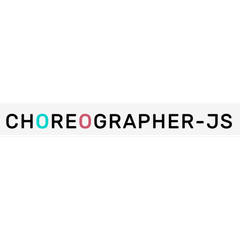
RequireJS
RequireJS is an efficient JavaScript file and module loader designed for optimal performance in-browser, while also functioning in environments like Rhino and Node. By promoting a modular approach, it enhances code speed and quality, supporting a range of browsers including IE 6+, Firefox, Safari, Chrome, and Opera.
Top RequireJS Alternatives
Voca
Voca is a robust library designed for efficient string manipulation, offering a variety of functions such as case conversion, trimming, padding, slugification, and more.
Multiple.js
Multiple.js is a JavaScript library designed to facilitate the unique effect of background sharing across multiple HTML elements without complex coordinate handling.
Omniscient
Omniscient enhances React by enabling fast top-down rendering through a functional programming approach.
Three.js
Three.js is a versatile JavaScript library designed for creating 3D graphics in web environments.
Choreographer-js
Choreographer-js simplifies intricate CSS animations by enabling developers to create dynamic effects based on scroll and mouse positions.
Lodash
Lodash is a modern JavaScript utility library that simplifies working with arrays, objects, strings, and numbers.
Bideo.js
It automatically adjusts the video to fit the container's dimensions and resizes with the browser...
Velocity.js
It supports color transitions, transforms, loops, easings, SVG, and scrolling, ensuring compatibility from IE8 to...
Animate On Scroll (AOS)
It features a global AOS object with methods to initialize, recalculate offsets, and refresh on...
Auth.js
It supports multiple authentication methods, including OAuth and WebAuthn, while ensuring compatibility with platforms like...
Annotator
Users can create annotations enriched with comments, tags, and links, while the plugin architecture allows...
Parsley
With automatic detection of form changes and a robust set of built-in validators, it adapts...
Glimmer
By compiling templates into low-level code, it ensures rapid execution without compromising user-friendliness...
Socket.IO
Its robust architecture ensures automatic fallback to HTTP long-polling when necessary and features reliable reconnection...
Modernizr
This allows developers to tailor user experiences, leveraging advanced features for modern browsers while maintaining...
RequireJS Review and Overview
With new digital technologies and APIs always on the rise, web developers require to be on the cutting edge at all times. Thus, deployed codes require to be debugged and updated from time to time. It may make coding seem like a cumbersome task, but with tools like RequireJS, developers can get the peace of mind that they require. RequireJS is a JavaScript library acting as a complete toolbox that can increase modularity, has tools to debug and optimize code, and can run on a variety of JavaScript environments like Node and Rhino.
Deployment blues and optimized delivery
RequireJS is designed to promote and allow ideal code deployment practices amongst web developers. Usually, when a non-optimized program runs on the server, it takes up a considerable lot of system resources, which can slow down or even crash other tasks. The reason for this is that several scripts and files run at once when a program runs and unless the server itself has some measure to handle parallel processing smoothly, a lot of CPU and memory are required to run it properly. What the RequireJS Optimiser tool does is that it intelligently unifies and compresses suitable scripts automatically.
A robust API that allows flexibility and dynamicity
Deployment needs to be smooth and error-free, and this is where RequireJS shows its magic. For this, it takes a multi-step approach toward deployment, starting with script loading. Its script loader uses a unique method of operation focusing on the modularity of the code, which makes it easy to debug in case of any issues. Also, it uses modules instead of traditional scripts, which are very similar to scripts, but they are independent of the global namespace, and thus has its own dependencies. This increases the loading speed of the code and prevents changes to the global namespace.
Advanced functionalities enabled by RequireJS
RequireJS library enables several functionalities into the standard code. These include the ability to used nested dependencies, which has several advanced use cases. Also, it allows tension-free development as the modules can be run in any order, due to their independent nature.
Top RequireJS Features
- Modular script loading
- In-browser optimization
- Compatibility with multiple browsers
- Usage in various environments
- Improved code speed
- Enhanced code quality
- Supports CommonJS syntax
- Easy inline script management
- Efficient dependency handling
- Simplified module definition
- Asynchronous script loading
- Built-in optimization tool
- Custom paths for modules
- Error handling support
- Dynamic module loading
- Lightweight library
- Supports AMD (Asynchronous Module Definition)
- Easily manageable script directories
- Versioning support for modules
- Extensive API documentation.














